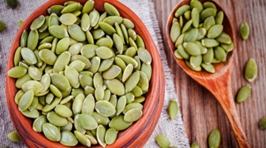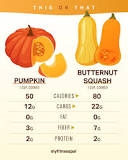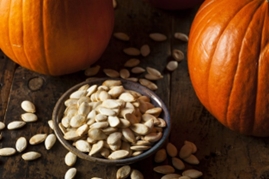Seeds can be a fantastic source of nutrition and pumpkin seeds are among the best! The pumpkin is a member of the squash family and it’s is native to North and Central America. Its seeds have been used by Native Americans for centuries to support urinary and digestive health. Just a single serving provides highly nutritious and necessary minerals such as magnesium, zinc, potassium, and iron.

As an added bonus, pumpkin seeds are packed with potent antioxidants. Simply put, the excellent nutritional profile of pumpkin seeds has not only made them an integral part of natural health, it’s also garnered the attention of researchers who have looked deeper into the health benefits of pumpkin seeds.
Improve Prostate and Bladder Health
Pumpkin seeds may help relieve symptoms of benign prostatic hyperplasia (BPH), a condition in which the prostate gland enlarges, causing problems with urination.
Several studies in humans found that eating these seeds reduced symptoms associated with BPH.
In a one-year study in over 1,400 men with BPH, pumpkin seed consumption reduced symptoms and improved quality of life.
Further research suggests that taking pumpkin seeds or their products as supplements can help treat symptoms of an overactive bladder.
One study in 45 men and women with overactive bladders found that 10 grams of pumpkin seed extract daily improved urinary function.
Are pumpkin seeds and squash seeds the same?
Pumpkin seeds are well-known for their nutritional value and fantastic flavor, but so are squash seeds. Just like pumpkin seeds, squash seeds are edible and have nutritional value. Don’t throw away squash seeds as they have a delightful nutty flavor. Both seeds can be roasted and salted, or you can spice them.
Which is better squash or pumpkin?
Butternut squash contains slightly more vitamin A and C compared to pumpkin and twice as much iron.

It’s also a good source of magnesium, vitamin E and potassium. Compared to pumpkin, it’s higher in calories and complex carbs and contains more than twice the amount of dietary fiber.
Squash seeds make a wonderful, nutrient dense crispy snack that is nutritious and full of nutrients like omega 3 fatty acids, protein, beta- carotene and vitamin C.
Squash has been studied for its health benefits and shows that when part of an overall healthy lifestyle and diet, it can help support reducing cardiovascular disease, cancer and diabetes risk.

The 7 Benefits:
1. Support for BPH
Pumpkin seeds have been recommended by natural and alternative health practitioners to support prostate health and BPH (benign prostate hyperplasia). The German Council E (Germany’s equivalent to the FDA) approved it for this use in 1985. And a 2009 Korean study isolated pumpkin seed oil to evaluate their effect on BPH. They reported that the pumpkin seeds produced a significant improvement in urinary flow and participants reported an improved quality of life.
2. Helps Balance Blood Sugar
Antioxidants are a potent source of phenols and antioxidant, this has caused led to it inquiries into its role in promoting balanced blood sugar levels — and the results have been positive. Additionally, the proteins in pumpkin seeds seem to have an anti-hyperglycemic potential. One study determined a positive impact on balancing blood sugar levels as a result of the bioactive proteins.
3. Toxic to Harmful Organisms
The US Pharmacopeia listed pumpkin seeds as a remedy for intestinal, harmful organisms until 1936. Does that mean it really didn’t work? Not quite, researchers in China tested pumpkin reported positive results when testing pumpkin seeds against tapeworms.
4. Nutritional Support for Cancer
Let’s be clear that pumpkin seeds are not a cure for cancer. However, it can’t be ignored that research into pumpkin seeds has described positive, nutritional effects for those with breast and prostate cancers. One 2012 study found a significant association between pumpkin seed consumption and promoting breast health. Another study indicated the lignans in pumpkin seeds may offer further breast health support. It doesn’t stop there, yet another study that examined a supplement containing pumpkin seeds reported positive potential for dealing with prostate cancer.
5. Great for the Heart
The powerful phytochemicals and omega-3 fatty acids contained in pumpkin seeds have led researchers to explore its benefits for cardiovascular health. Studies have found diets rich in omega-3 fatty acids, particularly alpha-linolenic acid, offer protective effects against ventricular fibrillation, a primary cause of cardiac death.
6. Promotes Healthy Cholesterol Levels
A double-blind, placebo-controlled 2011 study of postmenopausal women found pumpkin seed oil substantially promoted healthy cholesterol levels. The effects of the pumpkin seeds went beyond this one improvement — in addition to balanced cholesterol levels, the women taking pumpkin seeds also enjoyed healthy blood pressure.
7. Post-Menopausal Benefits
They also experienced a decreased severity of hot flashes, fewer headaches and reduced joint discomfort.
Eating Pumpkin Seeds
Pumpkin seeds are tasty by themselves, and they go great in a trail mix or salad. Pumpkin seed butter is another option that is delicious and lets you enjoy pumpkin seeds in new ways (spread on celery?). When shopping for pumpkin seeds, look for an organic, GMO-free option. If purchasing whole pumpkins, look for organic.
With a wide variety of nutrients ranging from magnesium and manganese to copper, protein and zinc, pumpkin seeds are nutritional powerhouses wrapped up in a very small package. They also contain plant compounds known as phytosterols and free-radical scavenging antioxidants, 1 which can give your health an added boost.
Nutrition facts: a 1-oz (28-gram) serving contains:
* Fiber: 1.7 grams.
* Carbs: 5 grams.
* Protein: 7 grams.
* Fat: 13 grams (6 of which are omega-6s).
* Vitamin K: 18% of the RDI.
* Phosphorous: 33% of the RDI.
* Manganese: 42% of the RDI.
* Magnesium: 37% of the RDI.
* Iron: 23% of the RDI.
* Zinc: 14% of the RDI.
* Copper: 19% of the RDI.
They also contain lots of antioxidants and a decent amount of polyunsaturated fatty acids, potassium, vitamin B2 (riboflavin) and folate.
Pumpkin seeds are a mixed bag of antioxidants – vitamin E, phytosterols and zinc – that reduce inflammation. They seem to support hair growth in balding men and may relieve menopausal women of some of their symptoms. Surprisingly, they may even reduce risks of breast, prostate and colon cancers.
Health Benefits of Pumpkin Seeds:
Supplies A Mixed Bag Of Antioxidants
Keeps Diabetes In Check
Controls Hair Loss
Relieves Arthritic Pain
Improves Urinary Function
The Bottom Line
Pumpkin seeds are highly nutritious and packed with powerful antioxidants. Eating them can help solve dietary deficiencies and may protect against various health problems. In fact, pumpkin seeds have been shown to improve heart health, blood sugar levels, fertility and sleep quality. They may even protect against certain types of cancer.
In addition, their rich nutrient content may provide other health benefits, such as improved energy, mood and immune function.
What’s best, they can easily be added to your diet, allowing you to reap their many positive effects.